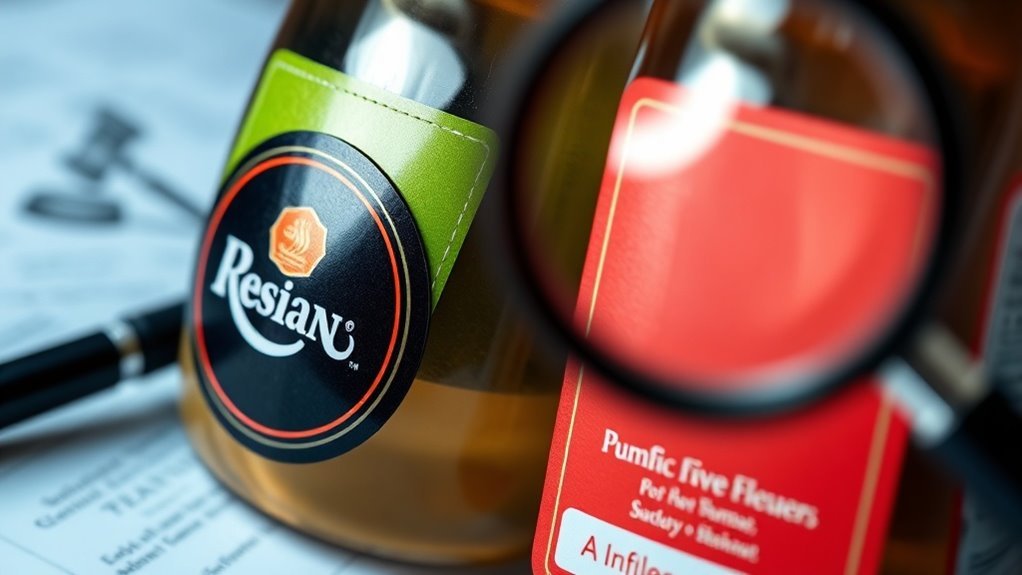Trademark Infringement: What You Need to Know
Trademark infringement in India occurs when an individual or entity uses a registered trademark without authorization, leading to confusion about the origin of goods or services. This can manifest through both direct or contributory infringement, resulting in legal consequences, financial damages, and harm to the reputation of the trademark owner.
To safeguard your trademark in India, it is essential to register it with the Trademarks Registry. Regularly monitor the marketplace for any unauthorized use of your trademark and take immediate action against any infringement. In the event of an accusation of infringement, it is advisable to compile all relevant evidence and seek legal counsel to navigate the complexities of trademark law.
There is much more to learn about trademarks and the mechanisms for protecting them within the Indian legal framework, so it is beneficial to continue exploring these aspects.
Key Takeaways
- Trademark infringement in India occurs when a trademark is used without authorization, causing consumer confusion regarding the source of goods or services.
- Types of infringement include direct infringement and contributory infringement, both of which can lead to legal consequences and significant financial repercussions under Indian law.
- Evaluating potential infringement involves assessing the similarities between marks and the likelihood of consumer confusion, which is determined based on various factors such as the nature of the marks, the goods or services involved, and the manner in which the marks are used.
- Registering a trademark in India provides legal protection, enhances brand credibility, and establishes a basis for enforcement against infringement.
- It is essential to respond promptly to infringement claims with comprehensive documentation and seek legal advice to effectively protect brand rights in India.
Understanding Trademark Infringement

When discussing trademark infringement under Indian law, it’s essential to grasp its fundamental definition. Trademark infringement occurs when an individual or entity utilizes a trademark or a similar mark that creates confusion regarding the source of goods or services. The core objective of a trademark is to identify and distinguish the products of one company from those of another. Infringing on a trademark can mislead consumers and jeopardize the reputation of the original brand.
In India, the Trade Marks Act, 1999 governs trademark protection and infringement issues. It’s important to note that even unintentional usage of a trademark may lead to legal repercussions under this Act. Trademark protections extend beyond logos to encompass brand names, product names, and slogans.
Additionally, the Act outlines remedies for infringement, allowing the trademark owner to enforce their rights effectively. It’s crucial for businesses and individuals to understand these intricacies and obligations to avoid potential legal disputes and ensure respect for others’ intellectual property. Furthermore, understanding the importance of early trademark registration can significantly bolster a brand’s defense against infringement challenges.
Recognizing the nuances of trademark law in India is key to safeguarding one’s own brand while respecting the rights of others.
Types of Trademark Infringement
When it comes to trademark infringement in the context of Indian laws and regulations, it’s essential to understand the different types that can occur.
You’ll often encounter direct infringement, where an individual or entity uses a trademark without the consent of the owner, which is a violation of the Trade Marks Act, 1999.
Additionally, there’s contributory infringement, which involves assisting or encouraging another party to infringe a trademark.
Understanding these distinctions can aid businesses and individuals in navigating potential legal issues more effectively, ensuring compliance with India’s intellectual property laws. Moreover, keeping an eye on monitoring trademarks is crucial in taking timely action against potential infringements.
Direct Infringement
Direct infringement in the context of Indian law occurs when an individual or entity uses a registered trademark without the permission of the trademark owner in a manner that’s likely to cause confusion among consumers.
This unauthorized usage may encompass similar logos, names, or slogans that may mislead consumers into believing that the products or services originate from a different source. For instance, if you were to sell products that closely resemble those of an established brand, it could create confusion among consumers regarding the source of the goods.
In India, to establish direct infringement, the trademark owner is required to demonstrate their rights to the mark and prove that the use of that mark results in a likelihood of confusion.
Remedies for direct infringement can include injunctions to stop the infringing activities, the seizure of infringing goods, and other equitable relief as deemed appropriate by the courts.
It’s crucial for businesses and individuals to ensure that they’re using trademarks correctly to prevent legal complications that may arise in the future.
Contributory Infringement
In addition to direct infringement, Indian law also recognizes contributory infringement, which involves a third party that knowingly assists or contributes to the infringement of a trademark.
If you’re found to be enabling another party’s infringement, you could face legal consequences, even if you didn’t directly infringe yourself. For example, if you sell products that you’re aware infringe on a trademark, you might be held liable under the Trademarks Act, 1999.
The critical factor here is knowledge; you must be aware that your actions are contributing to the infringement.
Businesses in India should exercise caution and avoid partnering with entities that could lead to trademark violations.
How Trademark Infringement Occurs

Trademark infringement in India can manifest in various forms, often catching businesses off guard. One prevalent method is through the unauthorized use of a trademark that creates a likelihood of confusion among consumers regarding the source of goods or services. This could involve the use of similar logos, slogans, or product names that may mislead customers into believing that products are affiliated with or endorsed by a trademark owner.
Moreover, if a trademark owner has granted a license for the use of their trademark, any misuse or deviation from the agreed terms by the licensee can also constitute infringement. Online platforms present additional challenges; employing a trademark in a domain name or social media account may lead to legal complications.
Unwittingly, businesses might imitate a brand’s style or image, unintentionally leading to claims of infringement. Therefore, it’s essential to comprehend what differentiates your trademark from others to protect your intellectual property effectively while steering clear of inadvertent violations under Indian laws.
Familiarity with the provisions of the Trade Marks Act, 1999 and relevant case law can aid in navigating potential trademark issues efficiently.
Consequences of Trademark Infringement
When a business engages in trademark infringement under Indian law, the repercussions can be significant and far-reaching. The rightful owner of the trademark may initiate legal proceedings, seeking remedies that could include damages for lost profits and statutory penalties.
Such legal battles can’t only affect the financial standing of a business but can also severely tarnish its reputation and erode customer trust. If a court finds the business liable for infringement, it may issue an order to cease the use of the trademark and even direct the destruction of infringing products.
Furthermore, the business may face diminished sales as consumers gravitate towards competitors perceived as more trustworthy and law-abiding. Ultimately, involvement in trademark infringement can jeopardize the entire business, underscoring the importance of understanding and respecting trademark rights in India. Conducting thorough research on common trademark rejection reasons before launching new products can help in mitigating such risks.
Protecting your brand is essential for maintaining credibility and achieving long-term success in the marketplace.
How to Identify Potential Infringement

When examining potential trademark infringement under Indian laws, the similarity of marks plays a crucial role.
It’s important to assess how closely the trademarks resemble one another and whether there exists a likelihood of consumers confusing one for the other.
Evaluating the likelihood of confusion is vital in establishing whether infringement may be taking place in accordance with the Indian Trademark Act, 1999. Additionally, understanding the importance of a well-crafted response can help businesses navigate potential legal challenges effectively.
Similarity of Marks
Identifying potential infringement in the Indian context often hinges on the similarity of marks involved. When evaluating marks, it’s essential to reflect on their appearance, sound, and meaning under Indian trademark laws.
Even minor differences can be significant, so it’s crucial to closely examine phonetic similarities or visual elements. If two marks are similar in these respects, it may confuse consumers, leading them to assume an association between the brands.
In India, trademarks can encompass words, logos, sounds, and even shapes, so it’s important to think broadly about what constitutes a mark.
Additionally, the overall impression a mark creates should be considered; sometimes, the collective elements form a more substantial impact than individual characteristics.
Likelihood of Confusion
Confusion among consumers is a significant factor in determining trademark infringement under Indian law. To identify potential infringement, you’ll want to examine several key elements.
First, assess the similarity of the marks and the goods or services they represent. If customers might mistake one for the other, it raises the possibility of infringement.
Next, consider the channels of trade; are both products sold in the same marketplaces or platforms?
Additionally, evaluate the target demographics. If both brands appeal to the same audience, this increases the likelihood of confusion.
Moreover, examine any past instances of confusion or consumer testimonies, as they can provide valuable insight into the issue.
Steps to Protect Your Trademark
Protecting your trademark is crucial for upholding your brand’s identity and value within the Indian marketplace. Here are some key steps to safeguard your trademark according to Indian laws and regulations:
- Register Your Trademark: Securing official registration with the Controller General of Patents, Designs and Trademarks (CGPDTM) in India provides you with legal protection and strengthens the credibility of your brand in the eyes of consumers and competitors. The cost and timeline of this process can vary based on the type of application you submit.
- Monitor Your Trademark: It’s important to regularly monitor for any unauthorized use or infringement of your trademark. By remaining vigilant, you can detect any violations early and take appropriate action to protect your rights.
- Enforce Your Rights: Should you encounter any infringement, it’s vital to act quickly. Taking action, such as sending cease-and-desist notices, can deter potential violators and maintain the integrity of your brand’s reputation within the market.
What to Do If You Are Accused of Infringement
Facing an accusation of trademark infringement can be intimidating, especially when it threatens your reputation and business operations. First, remain calm.
Take the time to review the claim thoroughly, keeping in mind the relevant provisions of Indian trademark law, particularly the Trade Marks Act, 1999. It’s essential to determine if the infringement is valid or simply a misunderstanding. Gather all pertinent documents and evidence to support your position.
If you believe you’re in the clear, consider responding to the accusation with a rebuttal letter, clearly outlining your arguments and providing evidence in your favor. Consulting with a legal professional who specializes in intellectual property law can guide you through this process effectively. Additionally, conducting thorough trademark research can help you understand the landscape of similar trademarks that may impact your case.
On the other hand, if the claim has merit, exploring a negotiation for a settlement or a licensing agreement could be a prudent approach. Engaging in discussions can often lead to a resolution that protects both parties’ interests.
Regardless of the option you pursue, it’s critical to act quickly to mitigate any potential damages and safeguard your brand’s integrity under Indian regulations.
The Role of Trademark Registration
When dealing with trademark infringement issues in India, understanding the importance of trademark registration can significantly influence your approach. Registering your trademark isn’t merely a procedural step; it serves as your primary line of defense against unauthorized use.
Here are several reasons why registering your trademark in India is advisable:
- Legal Protection: By registering your trademark, you secure exclusive rights to the use of that mark within India. This grants you the authority to prevent others from using a similar mark, thereby mitigating the risk of potential infringement claims against your brand.
- Brand Credibility: A registered trademark enhances your brand’s reputation in the Indian marketplace. It signals to consumers that you’re serious about your business and committed to quality, thereby fostering customer trust and loyalty.
- Legal Recourse: In the event of trademark infringement, having your trademark registered facilitates a more straightforward legal process. You’ll have the advantage of seeking legal recourse through the Indian judiciary, which can lead to stronger enforcement of your rights and the ability to obtain damages from the infringing party.
Furthermore, having a registered trademark can help you explore licensing agreements that can provide additional financial advantages.
Registering your trademark is therefore a strategic decision that can provide long-term benefits for your brand in India.
Seeking Legal Assistance for Trademark Issues
Navigating trademark issues under Indian laws can be intricate, making legal assistance essential. Whether you’re facing infringement claims or seeking to protect your brand, consulting with an attorney who specializes in trademark law is crucial. They can help you understand your rights as defined under the Trade Marks Act, 1999, evaluate the strength of your trademark, and guide you through the processes of filing applications or handling legal disputes.
An experienced attorney can also assist in conducting comprehensive trademark searches to avoid potential conflicts and help you safeguard your intellectual property effectively.
Addressing trademark issues proactively is important in preserving your brand’s integrity. It’s advisable to seek professional guidance early to navigate the complexities of trademark law in India more successfully. Protecting your brand through legal expertise is a prudent approach in today’s competitive market.
Questions
Can I Trademark a Name That Is Similar to an Existing Trademark?
You cannot trademark a name that is too similar to an existing trademark under Indian laws. This is primarily to prevent confusion among consumers regarding the source of goods or services. If a name resembles an existing trademark, the owner of that trademark could challenge your application or pursue legal action against you. It’s essential to conduct thorough research to ensure that your desired name does not infringe on any existing trademarks in India.
How Long Does Trademark Protection Last?
Trademark protection in India lasts as long as the mark is in continuous use in commerce and is renewed every 10 years. If the trademark is not used, the rights associated with it may be jeopardized. Therefore, it is crucial to remain proactive in maintaining the use and renewal of your trademark to ensure its protection.
Can I Sell My Trademark to Someone Else?
Under Indian law, trademark ownership is an important aspect of protecting your brand. Did you know that nearly 90% of businesses in India safeguard their brands through trademarks? Yes, you can transfer your trademark rights to another party, which allows them to use the trademark under agreed conditions. This transfer must be documented properly through a formal agreement to ensure compliance with the Indian Trademarks Act, 1999.
What Are Common Defenses Against Trademark Infringement Claims?
Several defenses can be employed against trademark infringement claims under Indian laws. These include demonstrating genuine trademark use, invoking the doctrine of fair use, asserting descriptive use, or proving that there is no likelihood of confusion among consumers. Each case is unique, so it is advisable to seek guidance from a legal expert to navigate the specifics of your situation effectively.
How Much Does It Cost to File a Trademark Infringement Lawsuit?
In India, filing a trademark infringement lawsuit involves a variety of legal and procedural steps. It’s essential to understand the process thoroughly before initiating any action. The Indian legal system provides a framework for protecting trademarks and addressing infringements.
To commence a trademark infringement lawsuit in India, a plaintiff must file a suit in the appropriate court. The lawsuit typically includes a detailed description of the trademark, evidence of the infringement, and the claims being made. The plaintiff may seek remedies such as injunctions to stop the infringing activity, damages for any losses suffered, or an account of profits made by the infringer.
It’s important to gather substantial evidence to support your case, including proof of trademark registration, instances of unauthorized use, and any communications related to the infringement. Engaging a legal professional with expertise in intellectual property law in India can provide guidance throughout this process, ensuring that all required documentation is properly prepared and submitted.
Additionally, trademark owners in India can explore alternative dispute resolution options, such as mediation or arbitration, to settle disputes more amicably. Understanding the intricacies of Indian trademark law will be crucial in navigating a successful infringement lawsuit.







